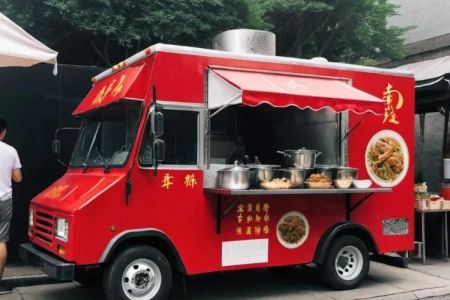How Much Does a Chinese Restaurant Make a Year?
If you've ever wondered about the financials behind your favorite Chinese restaurant, you're not alone. As someone who has always been fascinated by the restaurant industry, I’ve spent time researching how much a Chinese restaurant can earn annually. The figures can vary significantly depending on a variety of factors including location, size, and the type of services provided. After diving into the details, I learned a lot about the revenue models, operational costs, and profit margins that come into play for Chinese restaurants across the United States.
1. Factors Influencing the Annual Earnings of a Chinese Restaurant
When it comes to estimating how much a Chinese restaurant makes in a year, there are several key factors to consider. I was surprised to learn how much these variables can affect a restaurant’s profitability. Let’s break it down:
1.1 Location and Market Demand
The location of a restaurant is arguably one of the most significant factors that can affect its earnings. In major metropolitan areas like New York, San Francisco, or Los Angeles, Chinese restaurants tend to see higher foot traffic due to the large population and diverse customer base. Restaurants located in smaller towns or less populated areas, on the other hand, might have more modest earnings. I found that Chinese restaurants in bustling cities can see annual revenues ranging from $500,000 to $2 million, depending on the size and popularity of the location.
1.2 Restaurant Type and Size
Another key factor is the size of the restaurant and the type of service it offers. A small, family-owned takeout joint is likely to earn far less than a large, full-service restaurant with dine-in options and delivery services. From my experience, casual Chinese takeout restaurants can make around $300,000 to $600,000 annually, while upscale restaurants or those with large buffet-style offerings might pull in a much higher income of $1 million or more each year. Restaurant chains or franchises also tend to see higher earnings compared to independently owned locations.
1.3 Menu and Price Range
The menu offerings and price points also significantly influence a Chinese restaurant’s revenue. Restaurants that offer a wide variety of items at different price points tend to attract a broader range of customers. I’ve seen Chinese restaurants with higher-end menu options, such as specialty dishes or premium ingredients like lobster and abalone, earn more than those that stick to more basic offerings. A typical Chinese restaurant might see average ticket prices ranging from $10 to $20 per customer, which adds up over the course of the year.
2. Typical Annual Revenue for Chinese Restaurants
To give you a better idea of what a Chinese restaurant might actually earn, I looked at industry averages and real-world examples. According to reports, the annual revenue for an average-sized Chinese restaurant typically falls between $400,000 and $1 million. However, this number can be much higher for well-established restaurants or those located in high-traffic tourist areas. For instance, I found that high-end Chinese restaurants or those in popular food districts in large cities could make anywhere from $1 million to $5 million annually.
2.1 Small Takeout Chinese Restaurants
For a small takeout or delivery-focused Chinese restaurant, the average yearly revenue tends to be around $300,000 to $500,000. The low overhead costs (no dining area or waitstaff) help keep expenses down, but this can limit revenue growth. However, some small restaurants have found success by focusing on takeout and delivery, especially with the rise of food delivery platforms like UberEats and GrubHub, which has increased their earning potential.
2.2 Mid-Range and Upscale Chinese Restaurants
For mid-range or upscale Chinese restaurants that offer both dine-in and takeout services, annual revenue can range from $600,000 to $2 million. These restaurants often benefit from a larger, more consistent customer base, including both locals and tourists. Upscale restaurants in prime locations, especially those with unique menu offerings or celebrity chefs, can expect higher profits. For example, Chinese restaurants in famous neighborhoods like Chinatown in San Francisco can generate significant earnings due to high tourist traffic and a strong local market.
3. Operating Costs and Profit Margins for Chinese Restaurants
While revenue is important, it's equally crucial to understand the operational costs involved in running a Chinese restaurant. After all, a restaurant’s profit isn’t simply its revenue; it’s the money left over after expenses. When I looked into the costs associated with running a Chinese restaurant, I was struck by how much of a restaurant’s income goes toward overhead.
3.1 Food Costs and Ingredients
The cost of ingredients is one of the most significant expenses for any restaurant, including Chinese restaurants. On average, food costs in the restaurant industry range from 25% to 35% of the total revenue. For Chinese restaurants, the cost of ingredients for dishes like meats, vegetables, rice, and sauces is a large part of this. Interestingly, I found that restaurants with more expensive menu items, such as seafood or specialty meats, tend to have higher food costs, but also generate more revenue per dish.
3.2 Labor Costs and Staffing
Labor costs are another major expense, accounting for roughly 30% to 40% of a restaurant’s revenue. The wages for chefs, kitchen staff, and servers can add up quickly. Chinese restaurants often have multiple chefs and kitchen assistants due to the complexity of their menus. Additionally, some restaurants may offer 24-hour service, which requires a larger staff and more significant labor costs.
4. Marketing and Customer Retention Strategies
Effective marketing and customer retention strategies are key to a Chinese restaurant’s success. I found that many Chinese restaurants rely on word-of-mouth referrals, but in today’s digital world, having an online presence is essential. From my experience, restaurants that focus on social media marketing, local food bloggers, and online reviews tend to see higher traffic. Additionally, offering promotions, loyalty programs, and seasonal discounts can help increase customer retention, which is vital for sustaining long-term growth.
4.1 Utilizing Digital Marketing
In the modern age, digital marketing is essential. Many Chinese restaurants invest in their websites, social media platforms, and online food ordering services to keep up with competitors. From special Instagram-worthy dishes to leveraging Yelp reviews, a strong online presence can significantly boost revenue. I've also seen restaurants benefit from using online delivery services like DoorDash, which provides a great opportunity to increase visibility.
5. Conclusion: The Financial Potential of a Chinese Restaurant
Running a Chinese restaurant can be a rewarding venture, both financially and personally. With an average annual revenue between $400,000 and $2 million, Chinese restaurants have significant earning potential depending on their location, size, and menu offerings. Understanding the operational costs and profit margins is essential for maintaining a successful business, and effective marketing strategies are crucial for continued growth. By focusing on providing quality food and a great customer experience, restaurant owners can ensure their restaurant thrives in a competitive market.







